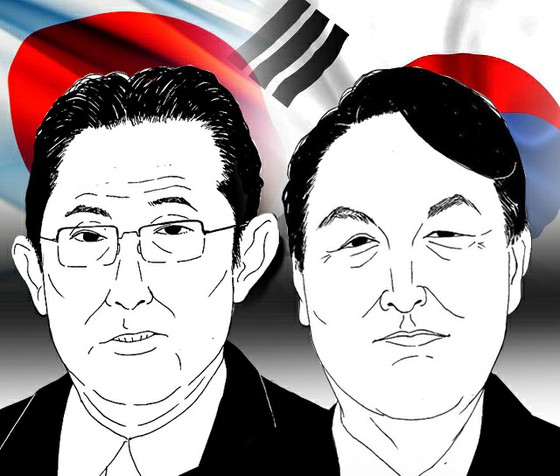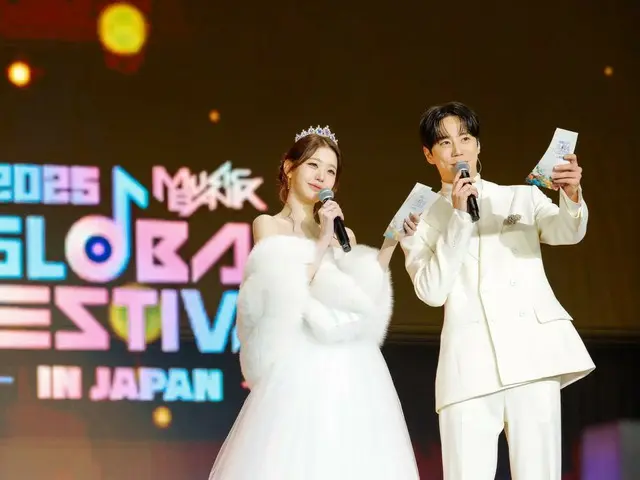 |
The summit was set after the South Korean government earlier this month presented a solution to the issue of former forced laborers, the biggest pending issue between Japan and South Korea. It was the first time in about 12 years since 2011 that a South Korean president had visited Japan to hold a summit meeting, except for one held in conjunction with an international conference. The two leaders agreed to resume mutual visits called "shuttle diplomacy," which had been suspended for a long time.
After the meeting, the two leaders held a joint press conference, where Prime Minister Fumio Kishida said, "After a long winter, we welcomed a South Korean president to Japan for the first time in about 12 years as a bilateral visit. We agreed to further develop Japan-South Korea relations based on the foundation of friendly and cooperative relations that have existed since the normalization of diplomatic relations in 1965." The prime minister also said that the South Korean government's solution to the former forced labor lawsuit issue was "evaluated as an attempt to restore healthy relations between Japan and South Korea, which had been in a very difficult state." "The Japanese government has confirmed that it has inherited the positions of successive cabinets on historical recognition, including the Japan-Korea Joint Declaration announced in October 1998," he said.
President Yoon Seo-gyul said, "This year, we will look squarely at the past and aim to develop a relationship based on mutual understanding and trust. "This year marks the beginning of a new era of Korea-Japan cooperation," he said.
After the summit, spokesman Lee Do-eun of the South Korean presidential office emphasized the achievement, saying, "If diplomacy is about opening the other's mind and turning the situation around, President Yoon Seok-yeol's diplomatic visit to Japan this time was a great success." However, the opposition party, the Democratic Party of Japan, criticized it as a 'diplomatic disaster.' LDP leader Lee Jae-myung said, "The Yoon administration ultimately chose to become a Japanese underling. There was absolutely no apology or remorse from Japan over the pending forced labor issue, and there was no mention of Japan's response that the South Korean government publicly announced." He criticized it severely, saying, "It's a tragic figure like a 'surrender ceremony' to offer tribute to Japan and beg for reconciliation." The party's floor leader Park Hong-geun also criticized Yoon's stance toward Japan, saying, "If you stand on Japan's side, you are not qualified to be the president of the Republic of Korea."
On the 29th, 82 Diet members belonging to the Democratic Party of Japan submitted a petition to the Diet requesting a national political investigation to find out the truth about the government's response to the summit meeting. After the petition is reported at the plenary session of the National Assembly on the 30th, it is expected that a special committee will be formed to investigate.
The scope of the national policy investigation requested by the Democratic Party of Japan this time is: ▲ Former Government's solution to the issue of forced labor and whether or not there are illegal acts such as dereliction of duty, breach of trust, abuse of authority, or violations of the Constitution in the waiver of the right to claim requisition ▲Takeshima during his visit to Japan (Korean name: Dokdo) and the comfort women issue ▲Whether or not there was a demand to lift import restrictions on fishery products from Fukushima Prefecture , the normalization of the GSOMIA (Japan-Korea Comprehensive Military Information Agreement), and the reasons for re-designating Japan as a preferential export destination.
Park Hong-geun, floor leader of the ruling party, emphasized, "Through the constitutional and lawful responsibilities and legal procedures, such as parliamentary investigations and hearings, we will resolve public suspicions and rectify humiliating diplomacy."
However, according to South Korean media, a national political survey targeting the summit is unusual. Recently, a national government investigation was conducted to find out the truth and prevent a recurrence of a traffic accident that occurred in Itaewon, a downtown area of Seoul, in October last year.
This time, the opposition parties are asking for a national political survey on the Japan-South Korea summit, and the ruling party "People's Power" is being investigated by the prosecution for multiple suspicions. After showing the view that there is an intention to turn a blind eye from the public, they criticized that he was "trying to confuse national politics."
2023/03/30 12:54 KST

![[Official Report] The first K-POP event to be held at the National Stadium! "2025 MUSIC BANK GLOBAL FESTIVAL IN
25 amazing artists gather at "Festival JAPAN" - A report from the first two days of excitement! (December 14th (Sunday) Report)](/img/topic/30/150353/302408_640W.webp)
